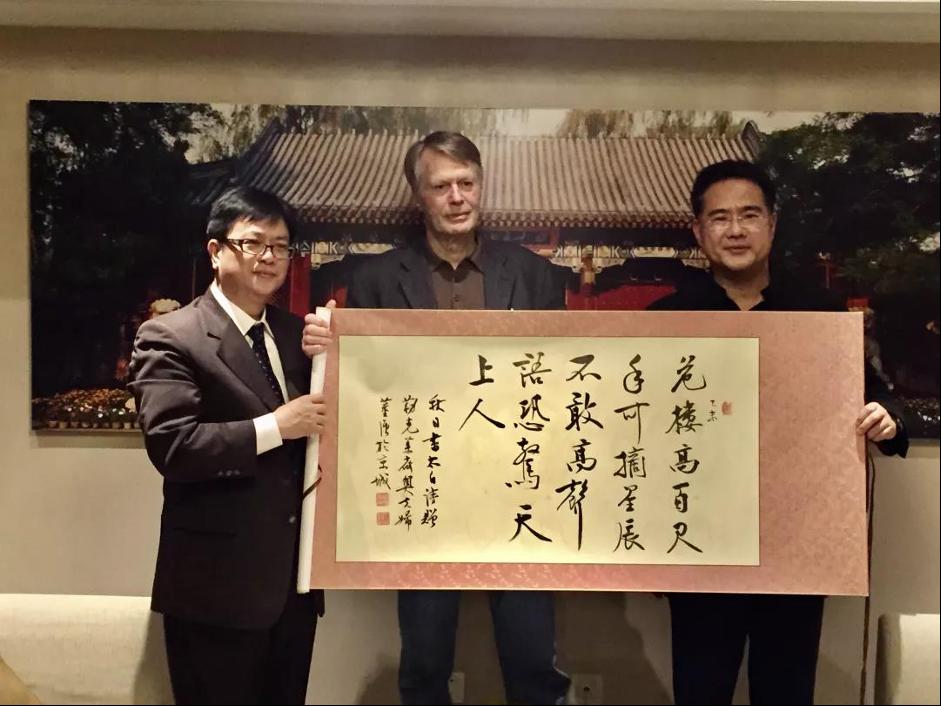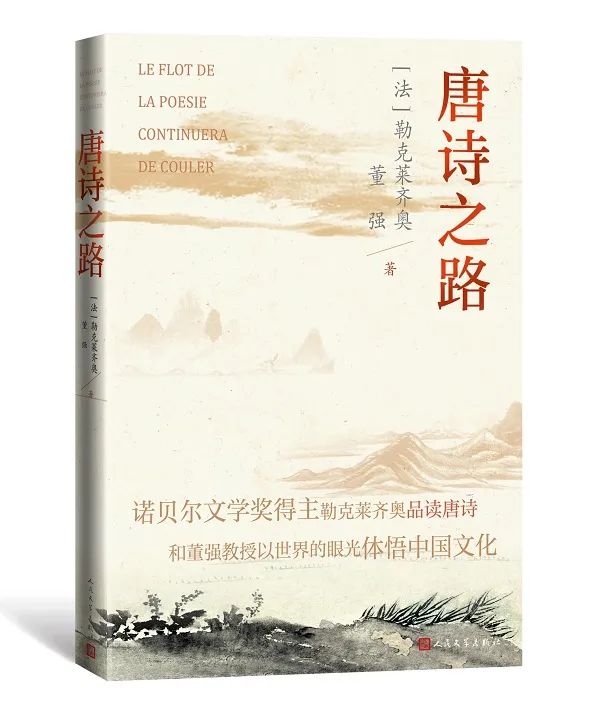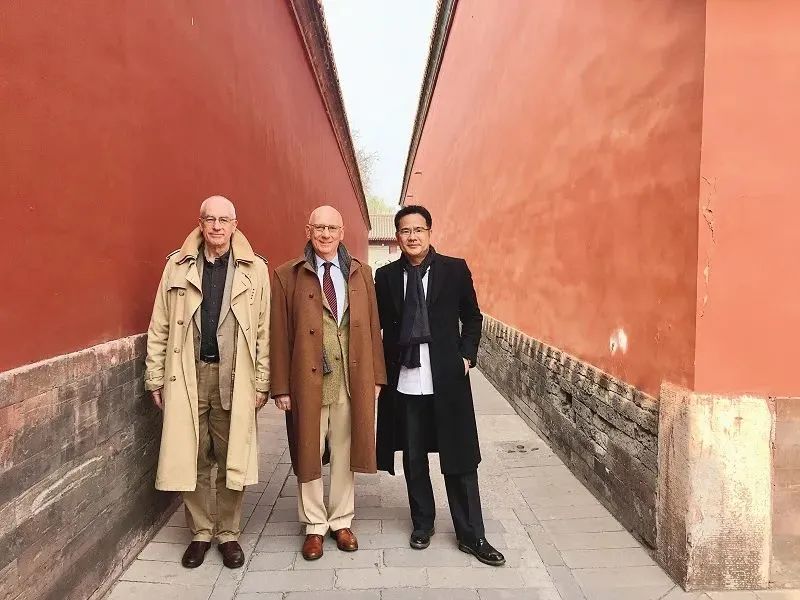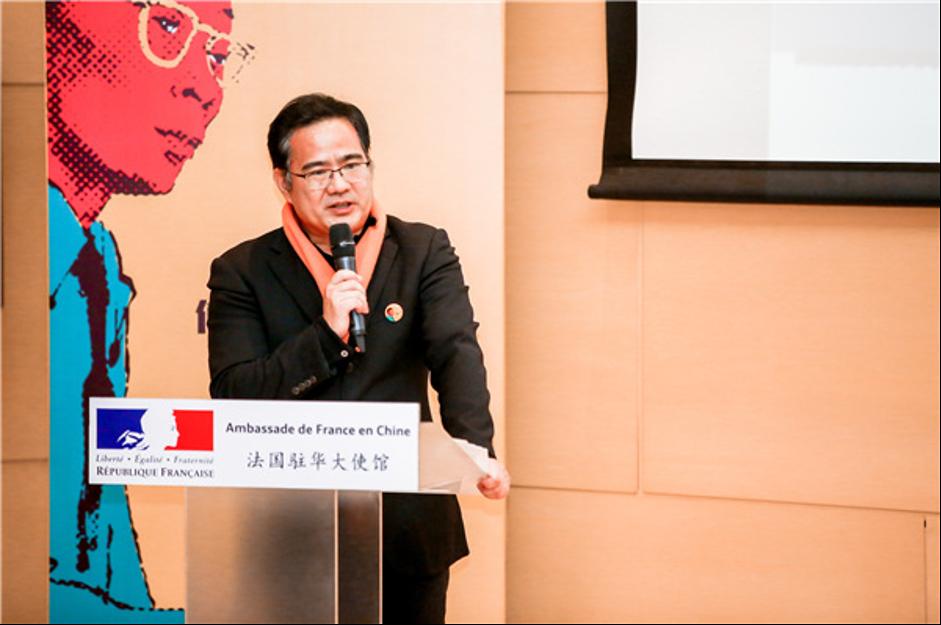Editor's Note: Professor Dong Qiang is commonly known for his capacity as Dean of the Yenching Academy, Professor and Chair of French Department of the School of Foreign Languages of PKU, but he is also a laureate of the prestigious La Grande Medaille de la Francophonie, awarded by the French Academy. He has visited France on many occasions with hopes to tell the China story and facilitate Sino-French cross-cultural communication. Let's delve into his voyage and discover culture and literature with him!
On Tang Poetry: Poetry is a Stream that Continually Flows
The book "The Road of Tang Poetry" is the fruit of a decades-long friendship between Professor Dong Qiang and Nobel Prize-winning French novelist Jean-Marie Gustave Le Clézio. They had their first chat in a Parisian café when Professor Dong was studying under Milan Kundera at the École des hautes études en sciences sociales. The two quickly got along, seeing as both had a deep interest in the other's culture.
Over the years, Professor Dong and Le Clézio shared countless discussions on classical and contemporary Chinese literature, which eventually culminated in an idea to co-author a book on Tang poetry. The duo thoughtfully selected poems that best represent the Tang era(618-907), widely considered as the golden age of Chinese poetry, and compiled a book with an entirely new French translations of said poems and illustrations of Professor Dong's calligraphy.
While revisiting Tang poetry, Professor Dong and Le Clézio explored the profound human nature expressed within it—the uncertainties in life and the struggles against war and famine. Despite the huge time gap, they felt close to the poets and artists of the Tang era, so much so that they felt as if they could understand them and the times they were in.
Through his works, Professor Dong hopes to share the beauty of Tang literature with as many as possible.

As a Cultural Envoy
Professor Dong is dedicated to bridging Sino-French cultures through his Chinese-French translations.
During the 2008 Beijing Summer Olympics, certain disruptions during the torch relay sparked a boycott against China in France. To remedy the situation, the Federation of Associations Franco-Chinoise—a non-governmental organization in Lyon—wanted to seek someone who could tell true stories of China to the French. They wanted the French to learn about the real China from a Chinese himself.
In July 2008, the head of the Federation came across Professor Dong's presentation about the Forbidden City in the cultural program "Des Racines et des Ailes" ("Roots and Wings") – one of the most well-known cultural heritage programs in France – on the French national TV.
To celebrate its decennial anniversary, the production team of "Des Racines et des Ailes" planned to shoot a special episode in the Forbidden City. They wanted to seek out a Chinese guest who could share stories of the Forbidden City in French on the show. While the production team were struggling to find someone suitable, they stumbled upon a French edition of the Chinese book "Mémoires d'une dame de cour dans la Cité Interdite" ("Memoirs of a Palace Maid"), which Professor Dong had translated. So, they tracked Professor Dong down through various channels and invited him to be the main guest on the show.
Professor Dong translated "Memoirs of a Palace Maid" back in 1994 for the French publishing house Editions Philippe Picquier. As a preface for the book, he wrote about stories that happened in the imperial palace of different dynasties of China, how the French discovered the Forbidden City, and his thoughts on how the French could further understand it today. And that is how cultural exchange was able to happen.
One step after another, every effort at communication was received and reciprocated by the other end in ways wholly unexpected, and that is how cultural exchange happens.

As a Lecturer
Professor Dong held lectures in many cities spanning across France. In every city, he makes an effort to conceive new topics covering China's history, education, painting, poetry, or the Reform and Opening-up. From city halls and middle schools to libraries and universities, lecture venues were drastically different. But irrespective of the venue, he would always dedicate an hour to the lecture and save another for questions.
He holds a strong conviction that the essence of exchange lies in two-way interaction and communication, not just someone standing at a podium unilaterally dispensing knowledge and then leaving after the lecture is over. In fact, to him, the question-and-answer segment is often more engaging than the lecture, since this is when the confusion and curiosity of the audience can finally be resolved.
Anyone who chooses to spend his spare time listening to a foreigner talk about his own country and culture naturally would have questions and expectations. As such, Professor Dong thinks if someone says something prejudiced on impulse, it should still be understood as these thoughts were likely gnawing at him for a long time. In such situations, Professor Dong would wholeheartedly listen to their questions and offer his most earnest answers. This is how he hopes to open the hearts of the audience to the narration and interpretation of a culture foreign to them.
Professor Dong fervently believes that before engaging in cultural exchange, he should first improve his own understanding of other countries. When he translated the Analects of Confucius, he was deeply impressed by Confucianist views on education, and how Confucius regarded his disciples as no less than himself.
Likewise, during cultural exchange, his audience were not disciples, but adults with their own knowledge structure, psychological characteristics, and cultural literacy. Only by fully respecting their rationality and knowledge, will foreigners be prompted to accept and recognize the unique values of Chinese culture.

Today, Professor Dong is referred to as a Cultural Conveyor between China and France, furthering Sino-French relations through cultural exchange. This pandemic might have caught many off-guard and halted many plans. But one day, the pandemic will fade, and by then, the world will resume its prosperous cultural exchange. Professor Dong looks forward to more voyages abroad to exchange ideas and uncover the common denominator of human nature that is veiled by our differences.
Source: PekingUniversity